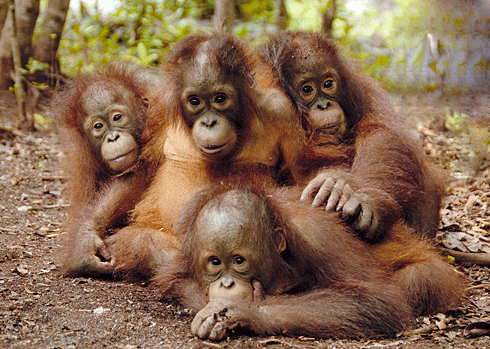
|
Published: 1 October 2012
Graduates successfully released back to the wild
The Borneo Orangutan Survival Foundation (BOS) has announced the release of 29 human-rehabilitated orangutans back into the Bornean wild. A further 20 are scheduled for release by year’s end, with another 100 due for release in 2013.

|
|
Some young orang-utans on their way through ‘school’ to learn how to live in the wild. Credit: BOS
|
Two of the leaders of this landmark program in Indonesia, Program Manager Anton Nurcahyo and Senior Scientific Advisor Simon Husson, are visiting Australia to provide personal accounts of this decade-long innovative program to rehabilitate orphaned orangutans and teach them, over a period of years, to live in the wild.
Having been painstakingly taught life skills including climbing, nest-building, sourcing food and identifying threats, the 29 graduates are being monitored closely and discretely by specially trained BOS guardians to ensure they remember their schooling and are safe and well.
‘Due to hunting, logging and deforestation for timber and palm oil plantations, the orangutan population has been in steady decline for the past few decades, and only 33 groups of orangutans of a viable size remain in Borneo today,’ said Tony Gilding, President of BOS Australia.
‘Without the tireless efforts of Anton, Simon and the entire BOS team on the ground at our rehabilitation and reintroduction centre in Borneo, these amazing creatures, who share 98 per cent of our human DNA, could be extinct within the next decade,’ he said.
‘Running the largest great ape reintroduction program in the world is extremely challenging, with literally hundreds of people and thousands of dollars required for each individual release,’ said Simon Husson, Senior Scientific Advisor to Nyaru Menteng’s BOS Reintroduction Centre.
‘But it makes us very happy that we’re able to give the orangutans a better future and a new, safe home for the rest of their lives,’ he said.
More than 600 orangutans are currently being kept in two Indonesian sanctuaries, ready for release into some 200,000 hectares of protected forest. However additional funds are urgently required to make these releases possible.
‘The journey for each orangutan back into the wild – including airlifting each primate to the release site in an effort to minimise the trauma of their relocation – encompasses a ticket price of AU$9450,’ said Gilding.
Source: BOS



